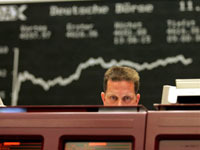Germany's economic development comes to standstill
 German economic growth slowed to a near standstill in the second quarter of this year, dealing a further, unexpected blow to the crisis-hit eurozone.
German economic growth slowed to a near standstill in the second quarter of this year, dealing a further, unexpected blow to the crisis-hit eurozone.
The surprisingly-sharp deceleration in activity in Europe's largest economy hit overall eurozone growth and intensified fears about the global slowdown. It also threatened to complicate the challenge facing the region's policymakers as they seek to combat its escalating debt crisis.
German gross domestic product increased by only 0.1 per cent in the three months to June compared with the previous quarter, the country's statistical office reported. Germany had been a star performer among western industrialised economies in the first quarter of this year. But data for the first quarter were also revised down to show a rise of 1.3 per cent compared with the 1.5 per cent originally reported, according to Financial Times.
"The poor German number has put paid to any optimistic sentiment this morning," said Dolmen Stockbrokers. The country's GDP grew 0.1% in the second quarter from the first three months of the year. Other euro-zone economies also remained weak, with Spain's GDP growing by just 0.2% on the quarter, Italy's expanding 0.3% and Portugal's GDP remaining flat.
The slowdown in economic growth was confirmed by the euro-zone GDP reading, which was up 0.2% in the second quarter against an 0.8% increase in the first quarter. It was the weakest quarterly reading since the euro area exited the recession in mid-2009.
Lloyd Barton, senior economic adviser to the Ernst & Young Eurozone Forecast said the data suggest the outlook for growth in the euro zone remains subdued, with the region caught up in a new bout of sovereign debt fears.
"The longer the sovereign debt market remains stressed, the greater will be the damage to the wider economy. A further deterioration in financial conditions could severely damage the outlook for the whole of the euro zone," added Barton.
By 1103 GMT, the Stoxx Europe 600 index was down 1.5% at 234.39. London's FTSE 100 was off 1.3% at 5282.06, Frankfurt's DAX was 2.5% lower at 5868.32, and Paris's CAC-40 declined 1.8% to 3180.40.
Sectors hurt by global growth concerns included autos, resources, construction and materials, together with industrial goods and services. All Stoxx Europe 600 indexes for each sector had posted losses of over 2% by noon in Europe, says Wall Street Journal.
Subscribe to Pravda.Ru Telegram channel, Facebook, RSS!




